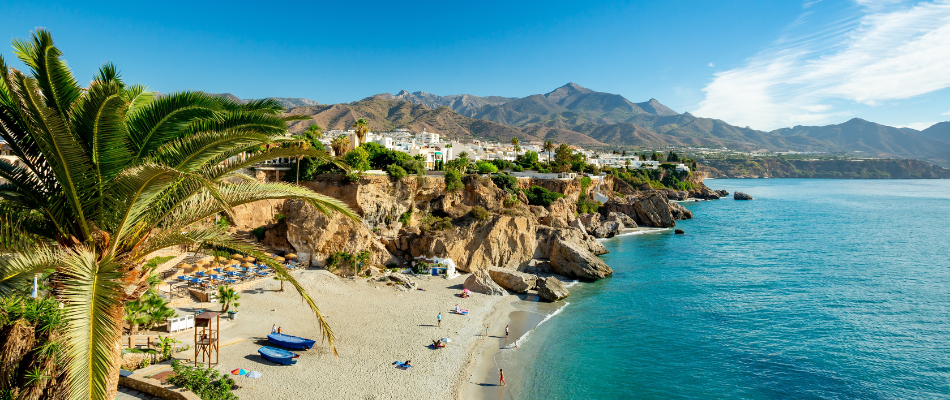-
Find your place in the sun
- Home
-
Property Search
- Property Search
-
Property in Spain
- Property in Spain
- Almeria
- Costa Blanca
- Costa del Sol
- Costa Brava
- Costa de la Luz
- Costa Tropical
- Murcia
- Valencia
- Inland Andalucia
-
Canary Islands
- Canary Islands
- Tenerife
- Fuerteventura
- Lanzarote
- Gran Canaria
- Balearic Islands
- All Areas
- Property in France
-
Property in Portugal
- Property in Portugal
- Algarve
- Albufeira
- Lagos
- Lisbon Coast
- Silver Coast
- All Areas
- Property in Italy
-
Property in Greece
- Property in Greece
- Aegean Islands
- Corfu
- Crete
- Halkidiki
- Ionian Islands
- All Areas
- Property in Florida
- Property in Cyprus
- Property in Turkey
- Search all countries
- New Developments
- Find an agent in...
- Most Popular Properties
-
-
Help & Guides
- Help & Guides
- How to Buy
- Area Guides
- Free Guide Download
- Professional Services
- Currency
- Mortgages
- Insurance
-
Relocation
- Relocation
-
Moving to Spain
- Moving to Spain
- Buying property in Spain
- Living in Spain
- Retiring to Spain
- How to move to Spain
-
Moving to France
- Moving to France
- Buying property in France
- Living in France
- Retiring to France
-
Moving to Portugal
- Moving to Portugal
- Buying property in Portugal
- Living in Portugal
- Retiring to Portugal
-
Moving to Italy
- Moving to Italy
- Buying property in Italy
- Living in Italy
- Retiring to Italy
-
Moving to Cyprus
- Moving to Cyprus
- Buying property in Cyprus
- Living in Cyprus
- Retiring to Cyprus
- Moving to Malta
- Find a Lawyer
- Viewing Trips Guide
- Articles
- Webinars
- New Developments
- Live Events
-
TV Show
- TV Show
- Episodes
- Presenters
- Apply
- Advertise with us
-
- Sign up / sign in
- Currency
- Find an agent
- Advertise with us
Cost of Ownership in Spain
 Buying a house in Spain is a really exciting process, but you'll need to think about how much owning a Spanish home will cost you in the long run too!
Buying a house in Spain is a really exciting process, but you'll need to think about how much owning a Spanish home will cost you in the long run too!
Before you commit to buying a property in Spain you should ask your independent Spanish lawyer to advise of you of the property's estimated running costs. This will help you to avoid any surprises when budgeting!
The running costs of your Spanish property will depend on the type of property you buy (villa, townhouse, apartment etc.) and whether or not you become a fiscal resident of Spain. Read on for an overview of the kinds of costs you can expect.
IBI: Annual Local Taxes
All properties are liable to council tax, which is known as IBI (Impuestos de Bienes Inmuebles). IBI is normally considerably cheaper in Spain than it is in the UK for a comparable property. Depending on where in Spain your property is located you can expect to pay this expense either once or twice per year.
IBI is based on the rateable value of your property and is paid to the local town hall. In some areas the cost of refuse collection (basura) will be included with IBI, in others it is a small separate charge. You will receive a bill for IBI followed by a payment document, and usually you will be provided with a timescale in which payment must be made.
Utilities
The most difficult aspect of paying your utility bills in Spain can be arranging for the accounts to be set up in your name. Unless you have good conversational Spanish we recommend asking for assistance from your adviser with this step.
As in the UK you can expect to be charged for the usage of water and electricity, but you may also pay a separate standing charge. Utility companies in Spain will not take payment from an overseas account and so you will need to set up a Spanish bank account to make sure your bills are paid on time.
Even if you do not use the property all year round you will be obliged by the utility companies to set up payment directly from your bank account. By maintaining sufficient funds in your bank account you will ensure that the supply is not disconnected while the property is not in use. Arranging for reconnection can be very time consuming and costly, as failure to pay utility bills ultimately results in the meters being removed altogether.
Community Fees on Developments
If you own a property in Spain that is part of a development then you will be obliged to pay community fees (Cuota Comunidad de Propietarios). These fees are paid by all property owners in a development, and go towards the maintenance of communal areas like swimming pools, gardens and even access roads.
Owners of properties with more extensive facilities - such as golf courses or spas - can expect to pay higher community fees. Details of such fees will be found in the documentation that was signed when you purchased the property, and the timing of such payments depends upon the community: monthly, annual or quarterly.
It is important to note that in communities with a large number of long term debtors, the other community members will eventually pay a higher fee. You should ensure that your adviser considers the minutes of the most recent annual general meeting of the community in order to receive a clear picture of the community’s finances, and issues that are affecting the development.
If you do not pay your community fees it is possible that the community could take legal action to recover the debt that could result in a charge being registered against your property and you may be refused access to facilities. Arrange for the payments to be made automatically from your bank account to avoid falling behind
Non-resident's income tax
If you own a home in Spain but don't live there permanently, you will be liable to pay non-resident’s income tax. Even if you do not rent it out you will be required to submit an annual return.
You can expect to pay an annual tax that is calculated on the basis of the rateable value (valor catastral) of the property. The tax payable will usually be very low, based on a taxable amount of 1.1% of the rateable value. If you do rent out the property then you will be required to submit quarterly returns declaring the income received and the expenses you have incurred in each quarter. You can expect to pay quarterly tax upon the net income earned at a rate of 19%, taking into consideration deductible expenses.
FAQs: Cost of Ownership in Spain
What are the monthly costs of owning a property in Spain?
Monthly costs depend on the type and location of the property, but common expenses include:
- Utilities: €100-€200 for electricity, water, and internet
- Community fees: €50-€150 for shared spaces (apartment blocks or gated communities)
- Maintenance: Varies, especially for pools or gardens
- Home insurance: ~€15-€30 per month
- Property management (if rented out): ~10-15% of rental income
These costs can vary by region, property size, and extent of services offered.
What taxes do I pay annually on a Spanish property?
Owners typically pay:
- IBI (Impuesto sobre Bienes Inmuebles) – Spanish equivalent of council tax, set by the local town hall
- Non-resident income tax – If you don’t rent out the property, you still pay tax on its “deemed rental value”
- Garbage collection tax (Basura) – A local fee, usually under €200 per year
- Wealth tax – only above certain thresholds which vary by region
Aside from any payable wealth tax these annual taxes are usually modest but should be factored into your ownership budget.
How much is IBI (council tax) in Spain?
IBI is calculated based on the cadastral value of your property, which is typically lower than market value. Rates vary between municipalities but usually range from 0.4% to 1.1% of the cadastral value. In many areas, this works out at a few hundred euros per year for a typical property. The local town hall (ayuntamiento) provides the exact amount.
Do I pay different taxes if I don’t live in Spain full-time?
Yes, non-resident property owners are subject to non-resident income tax (Impuesto sobre la Renta de no Residentes). Even if your property isn’t rented out, Spain assumes an imputed rental income and taxes it accordingly - usually at a flat rate of 19% for EU/EEA citizens or 24% for others. This is separate from IBI and must be declared annually.
Are there hidden costs when owning a property in Spain?
In addition to regular bills and taxes, buyers should budget for:
- - Legal/accountancy fees (especially for tax declarations)
- - Currency exchange and international transfer fees
- - Bank charges for Spanish accounts
- - Emergency repairs or upkeep in older properties
If you rent out your home, expect extra costs for licensing, property management, and local tourist taxes in some regions.
